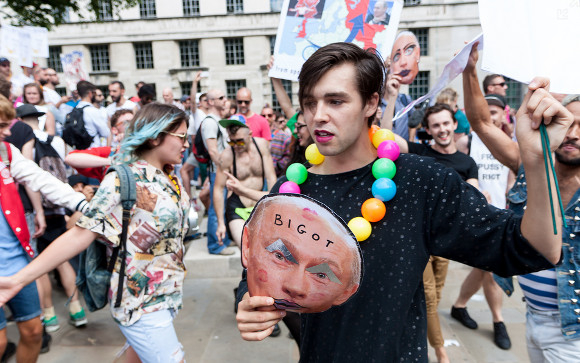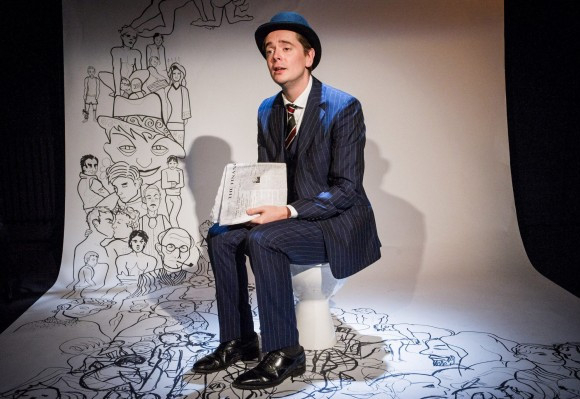Guest Blog: From Stonewall to Sochi – plays examine history of gay rights
Two upcoming productions are casting their eyes back over the history of gay rights at a topical time for the movement

© Zefrog
Sochi is in the headlines more as a symbol of Russia’s ban on “homosexual propaganda” than it is for the bobsleigh. It calls to mind another Olympics, the summer games in Mexico City 1968, when athletes Tommie Smith and John Carlos gave a “Black Power Salute” during a medal ceremony. Even then, they knew the world was watching.
In my play A Hard Rain (set one year later) Ruby, the Vietnam soldier-turned drag queen, declares: "If the coloreds can fight for their rights, then so can we". And while gay rights history lacks anything quite so powerful as those raised fists, or of Martin Luther King’s speech; and while gay rights have come about incrementally, compromise by compromise, there are nevertheless events worth remembering.
In A Hard Rain, Ruby – real name Rudi – is thrown out of the army for being gay. This “dishonorable discharge” means he is given no pension, no healthcare, and no chance of employment in any state institution or respectable business. With no prospects, he ends up holding court in the Bakers Inn, a fictional Mafia-run gay bar in Greenwich Village, New York, just round the corner from the similar, real-life Stonewall Inn. (The Mafia knew a lucrative hole in the market when they saw one, just as they had decades earlier when they opened drinking dens during Prohibition). The play is set in the few days leading up to the Stonewall riots, and follows the witty-but-volatile Ruby on a journey towards activism, prompted by his encounter with Jimmy, a 16 year-old homeless kid.
The Stonewall riots kicked off in the small hours of 28 June 1969, when police raided the bar for the second consecutive night. Officially, the raid was ordered because the liquor being sold there was bootlegged. But it was the clientele that were vulnerable in these raids: IDs would be checked, the odd cross-dressing "offender" thrown in the cells, and if your employer found out, you could be ignominiously sacked. But on this hot summer night, the clientele spontaneously fought back, and hard: the cops ended up barricaded inside the Stonewall while a crowd hurled missiles and Molotov cocktails in from the street. The protests that followed were an important moment in galvanising the gay liberation movement.

Opening a day before A Hard Rain is the West End transfer of The Act, a cabaret-style gem of a one-man show set in the decade between the Wolfenden report, which recommended the decriminalisation of homosexuality, and the eventual decriminalisation in 1967. The Act's central character, Matthews, is a gay civil servant whose younger, less high-profile lover turns him in to the police in a trade-off for the younger man’s freedom. In the dock, Matthews says "It seems to me that I am not on trial for what I've done but for what I am." The piece is inspired by the real-life 'Montagu' case and, like A Hard Rain, highlights the precarious vulnerability of those criminalised for their sexual orientation.
Of course, the underground gay worlds of 1960s New York and London offer fabulous material for the dramatist. Whereas documentaries and history books look back, plays exist in the moment and take you there: to meet the colourful rebels, to hear the fabulous music, to thrill at the illegality and, yes, the sex. It makes one yearn, just slightly, to be a part of it.
Some have been bemused that Sochi has become so overwhelmingly linked with Russia's gay rights clamp-down. But you don't choose your symbols, as the wonderful Edmund White wrote of Stonewall, which he dubbed the 'gay Bastille': "No matter that we were defending a Mafia club. The Stonewall was a symbol, just as the levelling of the [arguably inconsequential] Bastille had been… No one chooses the right symbolic occasion; one takes what's available."
In a very different way to Stonewall, Sochi is a symbol. I hope that A Hard Rain and The Act will, as well as entertaining you, be a reminder of what happens to people when a country treats a section of its own citizens as Russia is doing to gay people today.
A Hard Rain, by Jon Bradfield and Martin Hooper, directed by Tricia Thorns, is at Above The Stag Theatre in Vauxhall from 26 February-30 March.
The Act, by Matthew Baldwin and Thomas Hescott, is at Trafalgar Studios from 25 February-29 March.












